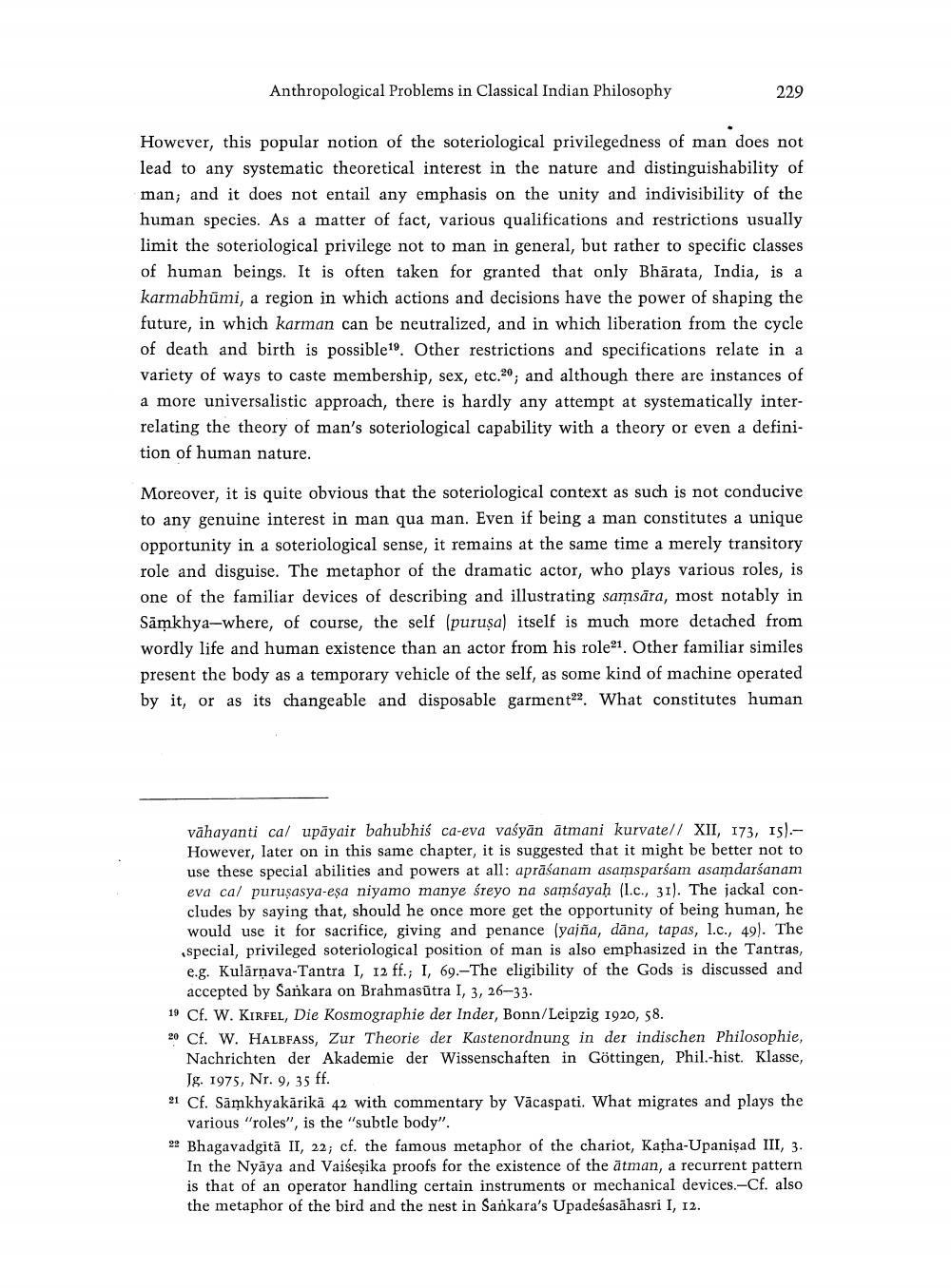Book Title: Anthropological Problems In Classical Indian Philosophy Author(s): Wilhelm Halbfass Publisher: Wilhelm Halbfass View full book textPage 5
________________ Anthropological Problems in Classical Indian Philosophy 229 However, this popular notion of the soteriological privilegedness of man does not lead to any systematic theoretical interest in the nature and distinguishability of man; and it does not entail any emphasis on the unity and indivisibility of the human species. As a matter of fact, various qualifications and restrictions usually limit the soteriological privilege not to man in general, but rather to specific classes of human beings. It is often taken for granted that only Bhārata, India, is a karmabhūmi, a region in which actions and decisions have the power of shaping the future, in which karman can be neutralized, and in which liberation from the cycle of death and birth is possible18. Other restrictions and specifications relate in a variety of ways to caste membership, sex, etc.20, and although there are instances of a more universalistic approach, there is hardly any attempt at systematically interrelating the theory of man's soteriological capability with a theory or even a definition of human nature. Moreover, it is quite obvious that the soteriological context as such is not conducive to any genuine interest in man qua man. Even if being a man constitutes a unique opportunity in a soteriological sense, it remains at the same time a merely transitory role and disguise. The metaphor of the dramatic actor, who plays various roles, is one of the familiar devices of describing and illustrating samsāra, most notably in Sāmkhya-where, of course, the self (puruṣa) itself is much more detached from wordly life and human existence than an actor from his role21 Other familiar similes present the body as a temporary vehicle of the self, as some kind of machine operated by it, or as its changeable and disposable garment22. What constitutes human vāhayanti ca/upāyair bahubhis ca-eva vaśyān ātmani kurvate// XII, 173, 15).However, later on in this same chapter, it is suggested that it might be better not to use these special abilities and powers at all: aprāśanam asamsparsam asamdarśanam eva ca/ puruşasya-esa niyamo manye śreyo na samsayah (1.c., 31). The jackal concludes by saying that, should he once more get the opportunity of being human, he would use it for sacrifice, giving and penance (yajña, dāna, tapas, 1.c., 49). The special, privileged soteriological position of man is also emphasized in the Tantras, e.g. Kulārnava-Tantra I, 12 ff., I, 69.-The eligibility of the Gods is discussed and accepted by Sankara on Brahmasūtra 1, 3, 26-33. 19 Cf. W. KIRFEL, Die Kosmographie der Inder, Bonn/Leipzig 1920, 58. 20 Cf. W. HALBFASS, Zur Theorie der Kastenordnung in der indischen Philosophie, Nachrichten der Akademie der Wissenschaften in Göttingen, Phil.-hist. Klasse, Jg. 1975, Nr. 9, 35 ff. 21 Cf. Sāmkhyakārikā 42 with commentary by Vācaspati. What migrates and plays the various "roles”, is the "subtle body". 22 Bhagavadgitā II, 22; cf. the famous metaphor of the chariot, Katha-Upanişad III, 3. In the Nyāya and Vaiseșika proofs for the existence of the ātman, a recurrent pattern is that of an operator handling certain instruments or mechanical devices.-Cf. also the metaphor of the bird and the nest in Sankara's Upadeśasāhasri I, 12.Page Navigation
1 ... 3 4 5 6 7 8 9 10 11 12
